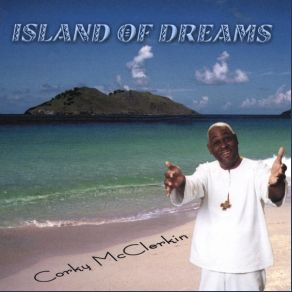Island of Dreams
Download links and information about Island of Dreams by Corky McClerkin. This album was released in 2002 and it belongs to Jazz genres. It contains 12 tracks with total duration of 01:06:29 minutes.

|
|
|---|---|
| Artist: | Corky McClerkin |
| Release date: | 2002 |
| Genre: | Jazz |
| Tracks: | 12 |
| Duration: | 01:06:29 |
| Buy it NOW at: | |
| Buy on iTunes $9.99 | |
Tracks
[Edit]| No. | Title | Length |
|---|---|---|
| 1. | Slick' N Slide | 5:07 |
| 2. | Africa | 7:57 |
| 3. | The Look of Love | 4:18 |
| 4. | I Say Freedom | 5:26 |
| 5. | Don't You Know How Come | 5:31 |
| 6. | Los Ninos | 5:12 |
| 7. | Farewell, My Friend | 5:01 |
| 8. | Sounds Good to Me | 8:01 |
| 9. | Island of Dreams | 5:52 |
| 10. | Love Upside Down | 5:52 |
| 11. | In a Sentimental Mood | 3:17 |
| 12. | Cancel Me Out | 4:55 |
Details
[Edit]A true man for all seasons, writer, speaker, and (of course) musician Corky McClerkin has been in films and has a master's degree in urban studies from Loyola University. He is an equally multifaceted musician — composer, arranger, pianist, flutist, as well as player of the dreaded synthesizer — on his latest album, Island of Dreams. He calls this undertaking a celebration of African-American musicians, looking back at what has happened and ahead to what may be next (hopefully not). One of the looking-back pieces is puzzling as to why it has been included. It's the Burt Bacharach/Hal David "The Look of Love." Neither of these gentlemen has been in the forefront of African-American music. True, it was big hit by Dionne Warwick, but that shouldn't qualify it as major African-American music. Besides, it's a cloying arrangement with electronically generated strings underneath a boring drum backbeat. Somewhat more satisfactory is "In a Sentimental Mood." But this wonderful music is distorted by a chime-like synthesizer-created sound. Tunes such as a swinging "Love Upside Down," where all the electronic gimmicky is put away, have some of Chicago's best musicians step in to let everyone know what jazz is. There are great solos by the likes of Sonny Seals and John Watson, with head-shaking drum breaks by Curtis Prince. McClerkin shows he is quite a prodigious piano player on this cut. And so it goes. Some of the material on this album is outright contrived while other material is downright excellent, including "Sounds Good to Me." Why couldn't McClerkin stick with material like the latter, which he does best, and leave the rest of the syrupy stuff to smooth artists?